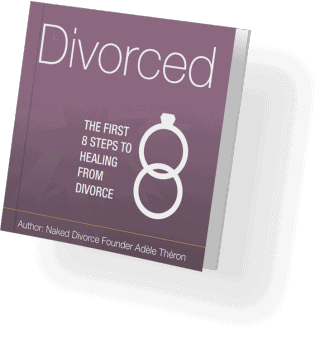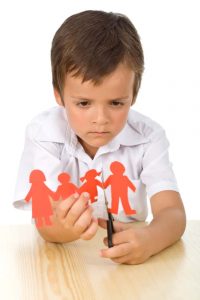
Free e-book: The First 8 Steps to healing from divorce
Your divorce is impacting your child’s exam results, so take action today

Yongmin Sun, co-author of one of the studies and assistant professor of sociology at Ohio State University said that “The effects of divorce take two time paths,” Sun said. “The damage in children’s psychological well-being is already observable three years prior to divorce, but gets worse as the divorce approaches. Yet, as the event of divorce recedes, the detrimental effect becomes smaller, indicating a recovery in children’s psychological well-being after the divorce. Test scores, however, continue to decline.”
Why does this happen?
For children and teens, having a stable home environment is critical to personal performance and their ability to concentrate. When parents are going through a divorce, *research has shown that teachers notice children displaying a range of emotions including but not limited to:
- Agitation
- Aggression
- Struggling to stay present
- Depression
- Withdrawnness
- Moodiness
These fluctuations in emotions impact the children’s ability to concentrate and perform at school.
The pain experienced by children at the beginning of a divorce comes from several factors: a sense of vulnerability as the family disintegrates, a grief reaction to the loss of the intact family (many children do not realise their parents’ marriage is troubled), loss of the non-custodial parent, a feeling of intense anger at the disruption of the family, and strong feelings of powerlessness. Acrimonious divorce, arguments over arrangements with children, changes in home and living situations, issues in ejecting one parent from home, an illicit affair and constant rowing can all cause extreme behavioural and long term damage with children.
One such family, the Jones’s from St Alban’s are still reeling from the impact of divorce. Mr Jones, a wealthy property developer, left his wife for a colleague at work. He was determined to ensure that although his marriage had ended, that his wife and children continued to provided for in the manner to which they were accustomed. Mrs Jones however was hurt by the affair and wanted revenge.
She hired a team of lawyers who began to investigate her husband’s business and she let him know she was taking everything: the house, the cars and would force him to sell all his properties so she could claim what was rightfully hers. The battle continued for 3 years and cost over £170000 in court fees alone. The impact on their three children was unquantifiable. The youngest developed learning disabilities and needed extramural remedial lessons; the middle son failed 5 courses in one year when previously he was a top student. The eldest daughter, a straight-A student, who was set for a degree at Oxford, fell pregnant in her final year of school and quit just before her exams. After 6 years of battling it out, Mrs Jones realised that her anger and revenge created a great deal of chaos in her family. When confronted by her final court bill, she said “I was so angry and instead of finding an outlet for my anger, I directed all of it at Ed and wanted him to pay. We lost everything as a result and I can see if I had just accepted his affair and moved on gracefully, the impact on the children would have been less. I feel very sorry that I didn’t receive better advice at the time. I made some very big choices at a very emotional junction of my life and I think if someone was thinking clearer than me, perhaps things would have worked out differently”
Common reactions of children to divorce
Emotional stability is critical to think clearly. The emotional impact of divorce can consequently drastically impact school performance as the reactions below describe:
- Preschool (ages 3-5): These children are likely to exhibit a regression of the most recent developmental milestone achieved. Additionally, sleep disturbances and an exacerbated fear of separation from the custodial parent are common. There is usually a great deal of yearning for the non-custodial parent.
- Early latency (ages 6½-8): These children will often openly grieve for the departed parent. There is a noted preoccupation with fantasies. Children have replacement fantasies, or fantasies that their parents will happily reunite. Children in this developmental stage have an especially difficult time grasping the permanence of the divorce and the impact on their school performance can last into their teens.
- Late latency (ages 8-11): Anger and a feeling of powerlessness are the predominant emotional responses in this age group. Like the other developmental stages, these children experience a grief reaction to the loss of their previously intact family. There is a greater tendency to label a ‘good’ parent and a ‘bad’ parent and these children are very susceptible to attempting to take care of a parent at the expense of their own needs. School performance is the most severe within this age-group.
- Adolescence (ages 12-18): Following divorce, adolescents are prone to acute depression, ideas of suicide, and sometimes violent acting-out episodes. These children tend to focus on the moral issues surrounding divorce and will often judge their parents’ decisions and actions. Many adolescents become anxious and fearful about their own future love and marital relationships. However, this age group has the capability to perceive integrity in their parents’ post-divorce and can show compassion for their parents without neglecting their own needs.
In a *study done in 2010, it was found that less than 10% of children had support from adults other than relatives during the acute phase of divorce, primarily because their parents were so wrapped up in dealing with their own pain that they were ill equipped to support their children. Find out more about having a child-centered divorce here.
So what does this all mean?
Molly, a recently divorced women who lives in Battersea, London with 3 children commented that her life felt like her divorce had completely taken over her life and laced it with grief and pain. “I was a walking zombie for weeks and weeks after Bill left. All I could do was feed myself, try to feed the kids and get them to school. I was in total shock as I didn’t expect him to leave me. It was only when little Sally’s teacher called and told me that Sally was failing tests at school that I suddenly realised I needed help and support”
Molly turned to the naked divorce Angel, Adele Theron to help get herself back on track. Adele spent a few weeks working with Molly and her children and had this to say:-
“In today’s society we just aren’t given the tools to deal with divorce, so women and men cope as best they can, which can lead to numbness, survival and depression. This has a very negative impact on their children. When airlines tell passengers that if there is a loss of cabin pressure and oxygen masks are required, that they should always first be fitted to the adults before anyone helps their children – the same thing applies to healing. If you are experiencing the trauma of divorce, it is imperative to prioritise your healing and support to ensure you are healed and making sound and rational decisions so you are emotionally available to support your children.”
There are some red flags to watch out for with children which can drastically impact their personal performance at school but also their emotional and mental wellbeing. If parents are choosing to divorce, it’s important they look out for changes in behaviour as indicated below:-
- Sleep problems
- Poor concentration
- Trouble at school
- Drug or alcohol abuse
- Self-injury, cutting
- Frequent angry or violent outbursts
- Withdrawal from loved ones
- Avoiding favourite activities
What can be done about it?
Collaborative divorce action
One of the elements to really control from the get-go is the mechanism for how you choose to divorce and choosing good people to help you manage the divorce. This is especially important when children are involved. Choosing a divorce lawyer is one of the most important aspects of getting a divorce. Your divorce lawyer is not simply required to reach a financial settlement but to do so in relation to emotionally sensitive issues. The importance of working with a divorce lawyer you can feel confident in, cannot be over emphasised. They must also be supportive in the advice they give. This relationship is extremely important as the work involves sharing personal information so your divorce lawyer needs to be someone you like, trust and can develop a good rapport with.
There are a number of different methods which may be employed to resolve a divorce and the associated issues concerning for example, money or children. These can include for example the traditional litigious route, mediation or the collaborative process.
Collaborative divorce or civil partnership dissolution has established a method for all parties involved in divorce or dissolution to work together so as to avoid confrontation and dispute; mutually agreeing all terms for the settlement of a divorce without the need for court appearances.
 At the outset of the divorce the respective collaborative lawyers and their clients will meet to sign a Participation Agreement. This is a formal contract recognising that all parties to the divorce are committed to working together to settle matters as amicably as possible. This will be achieved through face-to-face meetings, involving both the lawyers and their clients, for the discussion of objectives, and by the promise of full and frank disclosure of all relevant information. Letter writing and telephone meetings between lawyers are therefore negated as all issues are dealt with openly at the meetings.
At the outset of the divorce the respective collaborative lawyers and their clients will meet to sign a Participation Agreement. This is a formal contract recognising that all parties to the divorce are committed to working together to settle matters as amicably as possible. This will be achieved through face-to-face meetings, involving both the lawyers and their clients, for the discussion of objectives, and by the promise of full and frank disclosure of all relevant information. Letter writing and telephone meetings between lawyers are therefore negated as all issues are dealt with openly at the meetings.
Subsequent meetings in the collaborative process will deal with the parties particular priorities and concerns. Often it can be of enormous assistance to look at involving other professionals such as specialists in pensions and financial planning or people trained to assist children in understanding and coping with the changes that your divorce or separation will bring to their lives. The meetings will enable parties to reach agreement on how the finances will be shared or what arrangements need to be made for any children. Such meetings are conducted in a manner as to try and minimize confrontation and acrimony and to take the heat out of what can be extremely emotive issues.
In the final meeting documents detailing the agreements reached will be signed and the parties’ lawyers will discuss anything else that needs to be done in order to implement those agreements.One of the benefits of the collaborative process is that it’s not driven by a timetable imposed by the court. It can take place at the parties own pace and to large extent the process can be built around the family’s individual timetable and priorities.
Naim Qureshi of Mayfair firm, Gordon Dadds is collaboratively trained and specialises in this area of divorce and family work. He says this process lends itself to those who wish to resolve their divorce in a dignified and non confrontational manner and where there is a genuine desire by both parties to continue to effectively co-parent their children after the divorce.”
This approach is very favourable to the kind of situation the Jones’s found themselves in and like family mediation, alternative solutions to fighting divorce out in court are increasingly more popular and also the preferred option for limiting the negative impact on children.
Divorce coaching from a Divorce Coach
Whilst specific child counselling and support is a must, the important thing is to sort the problem out at its root. A divorce is a confusing, stressful and turbulent time that creates uncertainty and fear. Divorce coaching is a relatively new concept and is born out of a need for specialists to assist in the area of divorce. Generalist therapy and counselling were found to be ineffective in handling the very specific emotions and traumas encountered during a divorce. Divorce coaching is an individualized, collaborative process that focuses on:
- Coaching helps with the transition process by providing a soft landing spot to deal with frustrations, anger, loneliness and sadness
- Managing and processing emotions intensively so you heal within a clear period of time
- Developing goals for healing and a framework for healing
- Creating an action plan on how to achieve those goals
- Working towards redefining your life without your ex
- Divorce coaching assists and supports during this major life crisis
- The typical timeframe is 2-6 weeks.
It is also not about placing blame, finding fault or dealing with the past. It’s about creating a powerful new future and helps make the behavioural changes required to understand the emotional impact of what has hindered progress to date.
Molly, who worked with Adele for 6 weeks had this to say “it was utterly transformational. I am so happy I made the choice to get myself some help. I worked through my anger and frustrations and got to the source of why my marriage failed. I realised what I could be responsible for and that has lead to more open communication with Bill. It’s now 5 months later and we are a family again – albeit Bill and I are no longer together and working with a family mediator to split up, we are friends and working together in our transitioned partnership. We worked with the Naked Divorce Parent Plan which has provided a structure and routine to our children’s lives again. Our new partnership has been very healing for the children who are performing better at school and feel more stable and secure knowing that we don’t hate each other. It was an important day that I realised that I needed to be responsible for my impact on my children. Divorce coaching and family mediation worked wonders for our family.”
***
- Finally, let’s take a look at this list taken from 8 children of divorce aged between 5 and 14 who were asked what they needed from their mom and dad.
- I need both of you to stay involved in my life. Please write letters, make phone calls, and ask me lots of questions. When you don’t stay involved, I feel like I’m not important and that you don’t really love me.
- Please stop fighting and work hard to get along with each other. Try to agree on matters related to me. When you fight about me, I think that I did something wrong and I feel guilty.
- I want to love you both and enjoy the time that I spend with each of you. Please support me and the time that I spend with each of you. If you act jealous or upset, I feel like I need to take sides and love one parent more than the other.
- Please communicate directly with my other parent so that I don’t have to send messages back and forth.
- When talking about my other parent, please say only nice things, or don’t say anything at all. When you say mean, unkind things about my other parent, I feel like you are expecting me to take your side.
- Please remember that I want both of you to be a part of my life. I count on my mom and dad to raise me, to teach me what is important, and to help me when I have problems.
***
Consider that when emotions are high, intelligence is low and many big decisions are made by parents in the heat of divorce which have a very big impact on the future well-being of the children involved in the divorce.
It is therefore advisable that parents be aware of the broad spectrum of possible fall-out from divorce and provide sufficient support for their children in coping with divorce.***
If you enjoyed this post, I’d be very grateful if you’d help it spread by emailing it to a friend, or sharing it on Twitter or Facebook.
With you in service

 Book a Clarity Call for any divorce or break up support you need,
Book a Clarity Call for any divorce or break up support you need,
check out our resources or our Videos on Youtube
 Adèle Théron – Author, Change specialist, Family Mediator and Divorce Coach – has an 11 year career in helping people cope with change. She started off in the corporate world helping people adapt to new situations and experiences created by mergers, acquisitions and large software implementations. The change techniques she created have helped thousands of people in 18 global companies worldwide. When she herself experienced a divorce in 2009, she realised that no structured processes existed to help people cope with divorce and she used her change management techniques to develop a revolutionary systemized process called the naked divorce for healing from divorce within 21 steps. Adèle has worked with professional men, women and couples as a family mediator, divorce coach and divorce program trainer, helping people heal from break ups, separations and divorce. Today countless people depend on her process to help them heal from divorce. www.nakeddivorce.com
Adèle Théron – Author, Change specialist, Family Mediator and Divorce Coach – has an 11 year career in helping people cope with change. She started off in the corporate world helping people adapt to new situations and experiences created by mergers, acquisitions and large software implementations. The change techniques she created have helped thousands of people in 18 global companies worldwide. When she herself experienced a divorce in 2009, she realised that no structured processes existed to help people cope with divorce and she used her change management techniques to develop a revolutionary systemized process called the naked divorce for healing from divorce within 21 steps. Adèle has worked with professional men, women and couples as a family mediator, divorce coach and divorce program trainer, helping people heal from break ups, separations and divorce. Today countless people depend on her process to help them heal from divorce. www.nakeddivorce.com
 Naim Qureshi – Family and Collaborative solicitor – prides himself on being approachable and dealing with matters on a constructive and sensitive basis, seeking negotiated settlements whenever possible. In addition Naim is a qualified Collaborative lawyer and specialises in divorce and civil partnerships, property and financial disputes between partners, children disputes including national and international child abduction, cohabitation disputes between unmarried couples, injunctions, pre nuptial and pre civil partnership agreements.
Naim Qureshi – Family and Collaborative solicitor – prides himself on being approachable and dealing with matters on a constructive and sensitive basis, seeking negotiated settlements whenever possible. In addition Naim is a qualified Collaborative lawyer and specialises in divorce and civil partnerships, property and financial disputes between partners, children disputes including national and international child abduction, cohabitation disputes between unmarried couples, injunctions, pre nuptial and pre civil partnership agreements.
Naim is a member of the Law Society’s Family Law Panel. He has lectured and presented seminars on various family law subjects and has written articles and comments for legal journals and local and national press. Naim is also a freelance tutor at BPP Law School in London on the Family Law module of the Legal Practice Course and was Young Pro Bono Solicitor of the Year (South East region) in 2001.
*References
Alwin, D. (1973). The use of factor analysis in the construction of linear composites in social research. Sociological Methods and Research, 2, 191-214.
Block, J., Block, J. H., & Gjerde, P. F. (1986). The personality of children prior to divorce: A prospective study. Child Development, 5 7, 827-840.
Chase-Lansdale, P., & Hetheringon, E. M. (in press). The impact of divorce on life-span development: Short- and long-term effects. In D. L. Featherman & R. M. Lerner (Eds.), Life-Span Development and Behavior, 10.
Emery, R. E. (1988). Marriage, divorce and children’s adjustment. Beverly Hills: Sage.
Furstenberg, F. E, Jr., Morgan, S. P., & Allison, P. D. (1987). Paternal participation and children’s well-being after marital dissolution. American Sociological Review, 52, 695-701.
Furstenberg, F. F, Jr., Nord, C. W., Peterson, J. L., & Zill, N. (1983). The life course of children of divorce: Marital disruption and parental conflict. American Sociological Review, 48, 656-668.
Hetherington, E. M., Cox, M., & Cox, R. (1978). The aftermath of divorce. In J. H. Stevens, Jr., & M. Matthews (Eds.), Mother-child, father-child relations (pp. 149-176). Washington, DC: National Association for the Education of Young Children.
Herzog, E., & Sudia, C. E. (1973). Children in fatherless families. In B. M. Caldwell & H. N. Ricciuti (Eds.), Child development and social policy(pp. 141-232). Chicago: University of Chicago Press.
Joreskog, K. G., & Sorbom, D. (1981). LISREL user’s guide. Chicago: International Educational Services.
Levitan, T. E. (1979). Children of divorce. Journal of Social Issues, 35, 1-25.
McCall, R. B., & Stocking, S. H. (1980). Research about the effects of divorce on families. Boys Town, NE: The Boys Town Center.
Price, S. J., & McKenry, P. C. (1988). Divorce. Beverly Hills, CA: Sage.
SAS Institute (1982). SAS user’s guide. Cary, NC: Author.
Wallerstein, J. S., & Kelly, J. B. (1980). Surviving the breakup: How children and parents cope with divorce. New ‘York: Basic Books.
Zaslow, M. J. (1987, September). Sex differences in children’s response to parental divorce. Paper presented at the Symposium on Sex Differences in Children’s Responses to Psychosocial Stress, Woods
Hole, MA. Zaslow, M. J., & Hayes, C. D. (1986). Sex differences in children’s response to psychosocial stress: Toward a cross-context analysis. In M. E. Lamb, A. Brown, & B. Rogoff (Eds.), Advances in developmental psychology (Vol. 4, pp. 285-337). Hillsdale, NJ: Erlbaum.



Great Article. I hope that more parents will realize the impact of divorce on their children, particularly acrimonious divorce involving alientation of the other parent. Thanks for helping to raise the awareness.